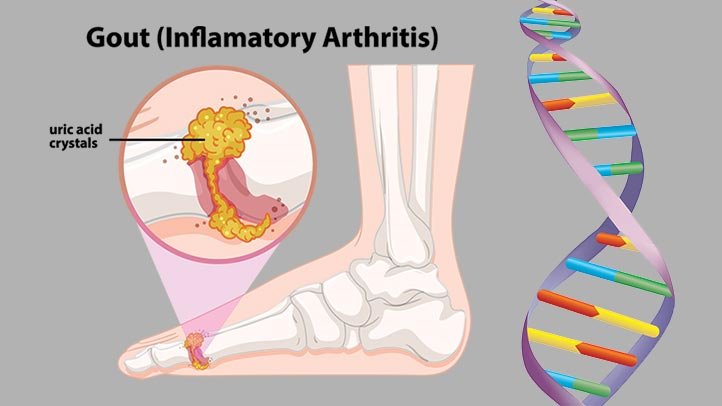
Uric acid can build up when the body has difficulty eliminating uric acid through the kidneys and urine, or, in some cases, when the body produces too much uric acid. The tendency to accumulate uric acid is often hereditary. It can, however, skip an individual or even a generation and reappear in the children of someone who has no signs of gout. While it is most commonly seen in males between fifty and sixty years of age, gout does occur in females and in younger males.
Symptoms
Gout usually starts with a sudden onset of intense pain in one or more joints, usually the big toe joint. The pain is accompanied by redness, swelling, and warmth over the joint. Typically, the patient does not recall injuring the joint before the pain started. Many patients say they first noticed pain in the middle of the night or upon arising in the morning. While symptoms most commonly occur in the big toe joint, any joint may be involved. Other common sites are the instep, the ankle, or the knee. When the foot is involved, wearing shoes is difficult and painful, as are attempts to move the joint or stand on the foot.
Diagnosis
The diagnosis is based on a personal and family history, as well as on the doctor’s examination which often finds the classic signs of gout and makes the diagnosis clear. Blood tests can performed to determine uric acid levels, and the joint fluid may be examined to look for uric acid crystals. X-rays may also be performed to examine both the bones and joints to rule out abnormal changes associated with gout.
Prevention
Certain foods that are high in purines can increase uric acid levels and thus bring on an acute attack of gout. These foods include red meats, shellfish, beer, red wine and salt. Some medications, such as diuretics (water pills) that are often used to control high blood pressure or reduce swelling, also may cause an acute attack of gout. Stress, infection, and trauma also are possible causes.
Drinking 6-8 glasses of water each day, eating an appropriate diet, and evaluating current medications will reduce the likelihood of an attack or lessen its severity should one occur.
